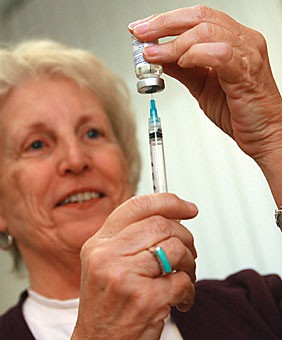The UA is taking precautions to ensure that it does not become the next victim of mumps outbreaks that have occurred recently on college campuses throughout the nation.
Although Campus Health Service has not seen any patients with mumps this year, Dr. Harry McDermott, the executive director, recommended that all UA students, faculty and staff check their mumps immunity status.
“”Individuals can do this by either confirming that they have received two doses of the measles, mumps and rubella vaccine, or by having a blood test done to check their immune status against the mumps,”” McDermott said.
Any person born since 1957 should have received two doses of the MMR vaccine or have documented immunity to mumps through a blood test.
Since December 2005, Pima County has investigated 31 possible mumps cases, said Lisa Hulette, the Pima County Health Department epidemiology manager.
Among the 31 investigated cases, 27 have been confirmed as testing negative, while two are probable cases and two others cannot be confirmed by laboratory tests, Hulette said.
“”The majority of these individuals visited areas in the country that experienced the major outbreaks, such as Iowa and other parts of the Midwest,”” Hulette said.
Mumps is a virus that causes symptoms that include fever, headache, tiredness, muscle aches and loss of appetite followed by swelling of the salivary glands in the cheeks, McDermott said.
“”Severe complications are rare, but mumps can cause inflammation of the brain and permanent deafness,”” McDermott said.
The virus replicates in the upper respiratory tract and is spread through direct contact with respiratory secretions or saliva.
There are no medications for the mumps virus, McDermott said.
“”The best treatment is supportive care, such as rest, adequate nutrition and medications for pain or fever,”” McDermott said. “”Since it is a viral illness, the body’s immune system has to take care of it.””
Since February, there have been mumps outbreaks on a few college campuses, with the most recent at the University of Virginia.
One issue that has been identified from this resurgence of mumps is that the MMR vaccine is only 85 to 90 percent effective in prevention, meaning an immunized person is susceptible to a milder case of mumps, McDermott said.
Transmission has been widespread in college-age students for reasons that may include social interactions, living environment, and local and interstate travel, according to the American College Health Association Web site.
There have been nine probable cases of mumps as of Oct. 10 at UVA, said Dr. James Turner, a UVA physician and chair of the American College Health Association’s Vaccine and Preventable Diseases Committee at UVA.
“”All cases are among undergraduates,”” Turner said.
If infected students live in the residence halls, they are sent home to their families or to an apartment owned by UVA for isolation known as the Mumps House. They are not supposed to attend classes or engage in university activities during this period, Turner said.
“”Our goal as well as advice to other colleges would be to aggressively identify cases and isolate them to keep them from contacting other students and community members,”” Turner said. “”It is also important to know who has not been compliant with the two-shot requirement and figure out how you are going to contact them to administer the vaccine.””









